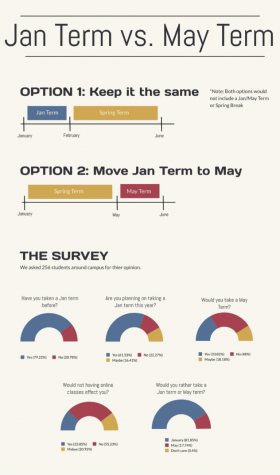Proposed changes to January term reveals mixed feelings among students
October 17, 2020
Campus has been buzzing with conversations and half-accurate rumors about an administrative proposal detailing changes to January and spring term schedules.
The proposal suggests starting the spring semester on January 18 and ending in April. Instead of holding January term, students would be offered the option of taking the condensed three-week term in May—after spring semester gets out.
Faculty department chairs were notified of the proposal on Friday, October 9 in advance to the department chair meeting on Monday, October 12. The Associated Students of Linfield University (ASLU) senate also took an anonymous poll on the proposal.
Spring semester usually starts mid-February and ends late May, but the administration is hoping to limit the chances of a COVID-19 outbreak on campus by inviting students back for spring term earlier and limiting breaks from school.
Sean Webster, president of ASLU, has been included in the meetings about the proposal. He assured students “it will be a fully functioning January term, but in May.”
Many details are not clear yet to students or faculty since it is only a proposal. Susan Agre Kippenhan, the University Provost, said the school will announce a firm decision on Monday, October 19.
It is unclear how this will affect OCE classes, graduation, and the study abroad program. This potential change does not affect the Portland campus.
One potential benefit to the proposal is that the usual January study abroad trips could be moved to the May term. Some speculate that COVID-related travel restrictions could be lifted by then.
It is likely that any plan moving forward will exclude a spring break. Students leaving and returning for spring break poses a greater risk to campus safety. Since testing is so expensive, the school would have to provide testing for all students at the end of that week.
In the meantime, The Linfield Review polled around 200 students to see which option they preferred. Overall, we found that most students do not know what the benefits are to having a May term over a January term.

One concern is that moving the spring semester up could induce financial hardships. Some students, like sophomore Ella Hillberry said, “I need to work the full break to have enough money to pay for spring semester.”
Hillberry already has a job in place for when she goes home to Ketchikan, Alaska. She is not the only one. Other students, like Abe Romero, said, “for me personally, going back in Jan term would hurt my work. The Jan term gives me enough time to reestablish myself financially.”
Sophomore Nursing major Olivia Kinuen is not personally opposed to having a May term over January term. However, she disagrees with the administration’s decision to change the plan this late in the semester.
“Especially during the pandemic when so many families are experiencing money insecurities and thought they would be able to rely on this break to save,” she said.
“It’s way too late to suggest a change,” said Bridger Hayes-Lattin. He maintained that a decision should’ve been made before students came to campus in the fall.
Webster points out that the administration is actually making a timely decision as course offerings for spring have not yet been announced.
Some students are fearful of the sudden change. “It’s kind of scary, because I don’t know now if graduation’s going to be in June or at the end of May still,” said senior Hannah Hopkins. “I’m just getting a lot of stress. I’m like, okay am I even going to be able to graduate?”
Webster said he also polled students as a president of ASLU. Most said they would still be in favor of a January term, but when he explained the potential benefits of May term, many of them changed their answer.
One aspect of the proposal is to eliminate the week-long break in between January term and spring semester. This means that students who participate in January term would go straight into spring semester.
Webster noted the student feedback he has been getting about fall semester, which this year did not include its traditional “fall break.”
“Students are tired, burnt out. It is going to be a hard push to go directly from January term into spring break,” Webster said. He added that a potential benefit to an early ending to spring semester could mean more summer job or internship opportunities.
Anna Frazier and Emma Inge contributed reporting.

Jessica Vice • Oct 22, 2020 at 9:54 am
For students that have to or decide to take May term courses, there wouldn’t be a break between the two in regards to remaining on campus and participating in course work anyways. As a senior student on campus, I’ve voted that Jan term remain, as I’d rather push through courses in the month of January on, instead of this random month of May. I appreciate the poll you gave to students, as it shows a majority of students voices decided against this!